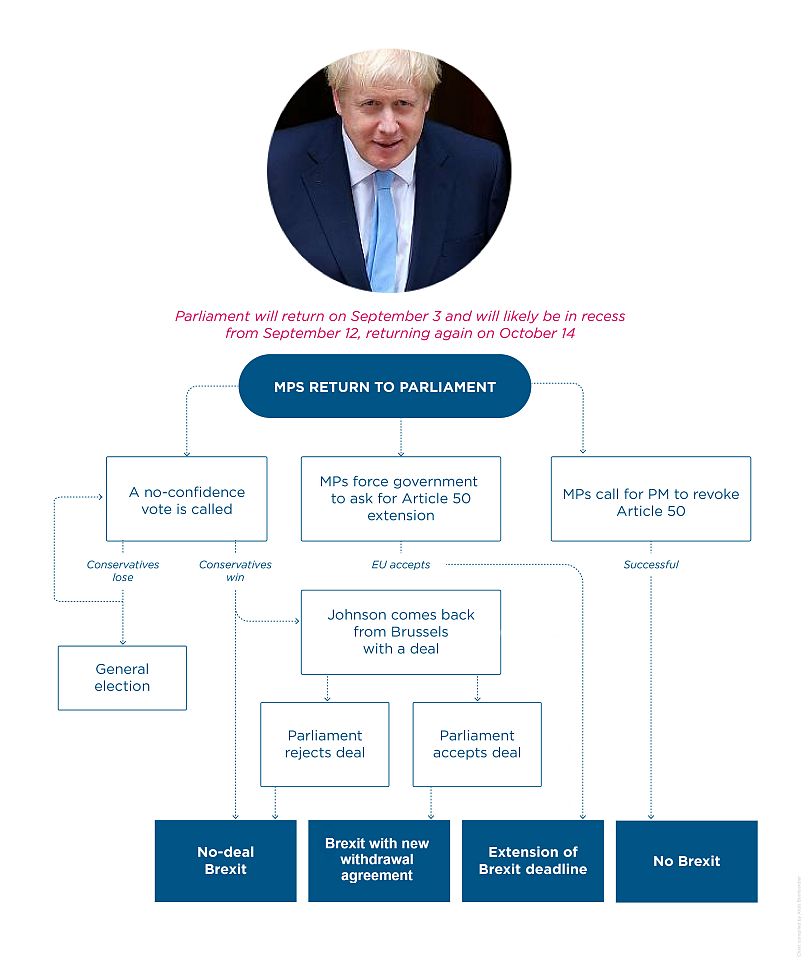The PMs decision to call for a Queen's speech reduces the time his opponents have to stop no-deal.
Boris Johnson’s decision to call a Queen’s speech on October 14 has been branded “a threat to democracy” by Labour leader Jeremy Corbyn, as it further reduces the amount of parliamentary time the opposition has to force the prime minister to abandon a no-deal Brexit.
The Privy Council has now confirmed that parliament will be prorogued from September 12 to October 14, reducing the number of days that MPs will sit between now and the Brexit deadline on October 31.
Britain’s parliament is on its summer recess until 3 September, which leaves nine working days for MPs opposed to Johnson to pass legislation that would either extend or rescind Article 50, or call a vote of no confidence in the prime minister that could trigger a general election.
Johnson has claimed that his decision to call a Queen’s speech - which is read by Queen Elizabeth II and lays out the agenda of the new government - has nothing to do with Brexit, arguing that as a new prime minister he is expected to lay out his legislative agenda.
It is not unusual for the Queen's speech to be preceded with a suspension of parliament for between five and 20 days, or for parliament to go into recess in mid-September for the conference season.
But critics see the move as a ploy to muffle opposition to Brexit in the crucial weeks before October 31.
Johnson is expected to travel to Brussels on October 17 and 18, and the expectation is that he will return with a deal, which will then need to be approved by parliament. Given the choice between his deal or a no-deal on October 31, even his critics will likely choose the former.
What can the opposition do?
Britain’s opposition has three options to stop Johnson in the parliamentary time that is left, says Tim Bale, professor of politics at the Queen Mary University of London.
As soon as parliament reconvenes they could push a piece of legislation that mandates the government to ask for an extension of Article 50.
Given that Johnson’s majority in parliament is currently just one MP, that attempt could pass if pro-Remain conservatives defect from the party.
They could also pass legislation that calls for the prime minister to revoke Article 50 altogether, stopping Brexit. This is less likely as it would hurt Labour MPs in pro-Brexit constituencies.
Lastly, they could call a vote of no confidence in Johnson which, if it passed, would likely trigger an election. This last option, says Bale, is probably the worst one.
“[This] might make a vote of no confidence slightly more likely - and I'm pretty sure that's what Johnson would like - but if they have any sense they will continue to steer away from that and not fall into his trap,” he said.
Read more
UK parliament suspension: Critics slam Johnson's move as 'a constitutional outrage'
Corbyn on Johnson: British PM 'wants to run headlong into the arms of Donald Trump'
'What a crazy time': Europe reacts to Johnson's parliament suspension plan for Brexit
No-deal Brexit: everything you need to know
Brexit Guide: where are we now?












